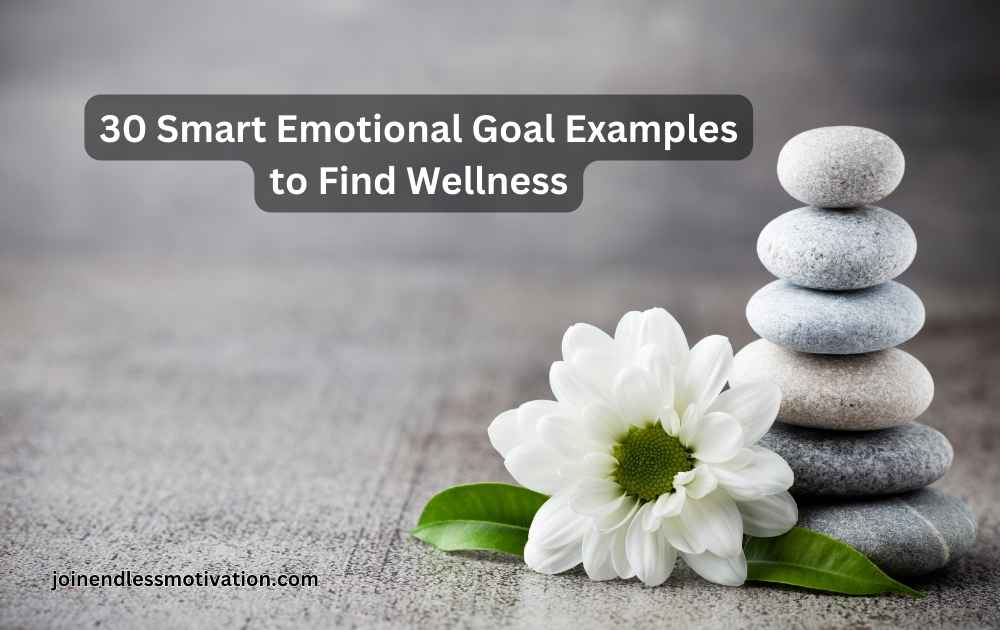When people set goals, they often focus on areas like finances or physical health. But emotional wellness goals are just as important, especially as mental health becomes a bigger priority for many. But what exactly are emotional goals, and how do they help? These 30 examples will help explain what emotional goals are and how they can positively impact your life.

What Are Emotional Goals?
Emotional goals are personal objectives that focus on improving your emotional well-being. Unlike goals related to finances or fitness, emotional goals are more about your inner growth. For example, someone might set a goal to handle stress better or build self-confidence in social settings. These goals are harder to measure because they don’t always come with clear numbers or progress markers. However, this doesn’t mean they aren’t achievable—it just requires self-awareness and commitment.
Why Set Emotional Goals?
Emotions play a major role in how we respond to challenges, so setting emotional goals can significantly improve your overall well-being. Though these goals might not show obvious results like a growing savings account or a healthier body, they offer other powerful benefits. People who set emotional goals often feel more hopeful about the future, even when facing tough situations. Having goals gives us direction, making the path forward clearer.
Working on emotional goals can boost your self-esteem and self-control. Knowing you’re actively improving yourself helps you feel more confident. It also adds meaning and purpose to your daily life, as you work toward something that truly matters to you.
For those who struggle with people-pleasing, emotional goals help shift the focus back onto personal growth. When you prioritize your mental health, making positive changes becomes more important than worrying about others’ feelings.
30 Emotional Goal Examples
Emotional goals vary from person to person, depending on individual needs and challenges. Taking time to define what’s important to you will help you set the right goals. Reading through examples of emotional goals can inspire you to start prioritizing your emotional health and well-being in a healthy way.
Here are 30 more smart emotional goal examples to help you find wellness:
1. Practice Self-Compassion
Make it a goal to be kinder to yourself. When you make a mistake or face a challenge, speak to yourself with the same kindness and understanding you’d offer a friend.
2. Improve Emotional Awareness
Commit to recognizing your emotions as they arise. Take a few minutes each day to check in with how you feel, and try to understand what’s behind your emotions.
3. Let Go of Perfectionism
Set a goal to embrace imperfection. Challenge yourself to accept that mistakes are part of growth and that striving for “good enough” is healthier than chasing perfection.
4. Build Resilience
Develop coping strategies that help you bounce back from difficult situations. This could include journaling, practicing mindfulness, or developing a mantra to use during tough times.
5. Cultivate Forgiveness
Work toward letting go of grudges or past hurt. Whether it’s forgiving someone else or yourself, forgiveness helps release negative emotions and promotes emotional healing.
6. Set Healthy Boundaries
Make it a goal to establish clear boundaries in your relationships. This protects your emotional well-being and helps you maintain healthy interactions.
7. Practice Empathy
Challenge yourself to truly listen and understand how others feel, without judgment. Practicing empathy can improve your emotional intelligence and strengthen relationships.
8. Reduce Negative Self-Talk
Set a goal to catch and reframe negative thoughts. Replace critical inner dialogue with more positive, constructive self-talk to build confidence and emotional resilience.
9. Focus on the Present
Make a commitment to practice mindfulness, allowing yourself to fully experience the present moment. This can reduce anxiety and help you stay emotionally grounded.
10. Engage in Regular Reflection
Set aside time each week to reflect on your emotional experiences. Journaling or meditating on your emotions can help you gain insight and identify areas for growth.
11. Embrace Vulnerability
Challenge yourself to open up more, whether it’s sharing your feelings with a trusted friend or being honest about your needs. Vulnerability can strengthen connections and emotional well-being.
12. Develop Positive Affirmations
Create and repeat positive affirmations to boost your emotional health. Using statements like “I am capable” or “I am worthy” can help shift your mindset over time.
13. Limit Social Media Exposure
Set a goal to reduce your time on social media. Unplugging regularly can help you focus on real-life connections and limit comparisons that may negatively affect your emotional state.
14. Acknowledge and Validate Your Emotions
Make it a priority to accept your emotions without judgment. Understanding that all emotions are valid, even the uncomfortable ones, can help you process them better.
15. Build Confidence in Social Settings
Set small, manageable goals to feel more comfortable in social situations. Practice introducing yourself to new people or engaging in group conversations to boost your social confidence.
16. Focus on Gratitude Journaling
In addition to expressing gratitude, make it a goal to keep a gratitude journal. Writing down things you’re thankful for each day helps you stay emotionally positive.
17. Strengthen Your Emotional Vocabulary
Work on expanding your emotional vocabulary by learning new ways to describe how you feel. Being able to articulate emotions can help you better process and share them.
18. Practice Saying “No”
Set a goal to become more comfortable saying “no” when something doesn’t align with your emotional well-being. This helps set boundaries and protects your mental health.
19. Seek Constructive Feedback
Make it a goal to ask for feedback from trusted individuals in your life. Listening to others’ perspectives can help you grow emotionally and improve your relationships.
20. Develop Patience with Yourself
Be intentional about giving yourself time to grow emotionally. Remember that personal growth is a journey, and it’s okay to take small steps.
21. Create an Emotional Support System
Identify people in your life who provide emotional support and make an effort to nurture those relationships. Having a strong support system can help you through difficult times.
22. Commit to Conflict Resolution
Make it a goal to address conflicts in a healthy, productive way. Learn to communicate openly and calmly in disagreements to resolve issues without damaging relationships.
23. Find Emotional Outlets
Explore creative outlets for your emotions, whether it’s through art, music, writing, or another hobby. These outlets can help you process feelings in a positive way.
24. Focus on Self-Awareness
Set a goal to understand your emotional triggers and patterns. Recognizing what sets off certain emotions can help you manage them more effectively.
25. Celebrate Small Wins
Practice celebrating your emotional growth, no matter how small the step forward is. Acknowledging progress helps keep you motivated.
26. Develop Conflict Resolution Skills
Learn techniques to handle disagreements calmly and constructively. Practice staying calm in tense situations and communicating your emotions effectively.
27. Enhance Your Emotional Flexibility
Set a goal to be more flexible with your emotions, allowing yourself to adapt to change and new experiences without resistance or fear.
28. Take Regular Mental Health Breaks
Schedule time for yourself to unwind and recharge emotionally. Whether it’s through meditation, reading, or just sitting quietly, breaks are essential for emotional health.
29. Reduce Overthinking
Make it a goal to recognize when you’re overthinking situations. Practice letting go of unnecessary worries and focusing on what you can control.
30. Invest in Self-Care
Prioritize self-care practices that support your emotional well-being. Whether it’s taking a bath, going for a walk, or reading a good book, these activities help you recharge emotionally.
Best and Recommended for your Motivation
100 Good Morning Happy Monday Inspirational Quotes
100 Career Affirmations for Success and Fulfilment
75 Motivational Single Words for Your Motivation
125 Motivational Quotes to Inspire Hard Work and Determination
100 Best Inspiring Motivational Quotes for September
100 Best Inspiring Motivational Quotes for October
150 Positive Inspirational Good Morning Smile Quotes
125 Weekend Inspirational Quotes For An Inspired Life
75 You Are Good Enough Quotes To Boost Self-Esteem
100 individual goals examples to set for yourself
115 Powerful Abundance I Am Affirmations for Success
125 Best Growth Mindset Quotes to Embrace Challenges
100 Self Doubt Quotes To Boost Your Confidence
150 Powerful Three-Word Affirmations for Success
100 Self-Doubt Quotes to Boost Your Confidence and Motivation
25 Mantras to Remove Negative Energy and Negativity
85 Top Motivational Quotes About Struggle In Life
100 Inspiring Thankful Appreciate Small Things Quotes
100 Motivational Quotes for Students When Things Get Hard
150 Positive Attitude Quotes & Instagram Captions For Men
70 Feeling Drained Quotes for When You’re Exhausted






